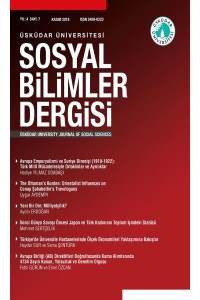Abstract
Keywords
Capital punishment death penalty value of life meaning of death meaning of life biological perspective in death penalty
References
- A. E. Taylor, Aristotle, New York: Dover Publications, 1955.
- A. J. Arberry, The Koran Interpreted, (New York: Macmillan Publishing, 1976).
- Abdullah Yusuf Ali, The Holy Qur’an: Text, Translation and Commentary, (Brentwood, Maryland: Amana Corp., 1983)
Abstract
Ölüm cezası ile ilgili felsefi sorunlar, iki önemli konunun anlaşılmasını içerir; Bu konulardan biri hayat ve diğeri ölümdür. Dolayısıyla, bu yazıda, ahlaki açıdan ölüm cezası konusundaki tartışmamız, bu iki olgudan anladığımız şeylere bağlı olacaktır. Hayatın doğası ile ilgili önemli teoriler ilk etapta üçe ayrılabilir: Aristoteles’in hayat görüşü; Descartes tarafından savunulan mekanik hayat görüşü; Kant’ın hayatı «organizasyon» olarak tanımlaması. Bunlara Darvinci hayat kuramını, halen değişmekte ve gelişmekte olan yeni bir perspektif olarak da ekleyebiliriz. Darwin’in ve daha sonra evrimci biyologların biyolojik yaklaşımı materyalisttir. Darwin yaşamın kökenini araştırdığı için onun biyolojik açıklaması, hayatın doğasını da yan ürün olarak verecektir. Hayatın önemli bir anlamı varsa onu korumaya çalışacağımızı iddia etmeye çalışacağız. Bu ölüm cezası için bir sorun oluşturabilir. Bu noktada, ölümün mahiyetini de açıklamamız gerekir. Daha sonra ölümü tanımlamaya çalışacağız. Nihai analizde bu, ölüm cezasını manevi açıdan incelememizi gerektirecektir. Değinmek istediğim bir başka noktamız daha var: Din, insan hayatında önemli bir rol oynadığından, ölüm cezasının ahlaki
olup olmadığı konusundaki tartışmalarda ihmal edilemez ve bu nedenle bu konuyu incelemeye çalışacağız. Bütün bu tartışmaların süregeldiğini ve sorun çözülmeden bu görüşlerin birbirlerini tekrar ettiklerini göstermek isterim. Her halükarda, ölüm cezasının kaldırıldığı ve ömür boyu hapis cezasına çevrildiği birçok ülke olduğu gibi hala ölüm cezası uygulanan birçok ülke de bulunmaktadır. Bu çalışmadaki tartışmam, kültürümüzde İslamı’ın bu soruna nasıl bir çözüm sunduğuna dair bir tartışma ile son bulacaktır.
Keywords
Ölüm cezası hayatın anlamı hayatın değeri ölüm ölümün anlamı ölüm cezasına biyolojik yaklaşım
References
- A. E. Taylor, Aristotle, New York: Dover Publications, 1955.
- A. J. Arberry, The Koran Interpreted, (New York: Macmillan Publishing, 1976).
- Abdullah Yusuf Ali, The Holy Qur’an: Text, Translation and Commentary, (Brentwood, Maryland: Amana Corp., 1983)
Details
| Primary Language | English |
|---|---|
| Journal Section | Articles |
| Authors | |
| Publication Date | May 25, 2018 |
| Submission Date | February 20, 2018 |
| Published in Issue | Year 2018 Issue: 6 |
Cite
The opinions in the articles published in Üsküdar University Journal of Social Sciences belong to the author. The articles published in another journal, book, and so on are not accepted. National or international conference presentations, seminar presentations, or panel presentations can be included in the publication process after being specified in the footnote and converted into the article format.
Academic articles published in the journal can only be reproduced for educational purposes. The articles and the graphics and tables in the articles cannot be duplicated or archived in part or as a whole without permission except for educational purposes. Quotations may be made from the articles under the condition that they are indicated in the academic publications.
It is assumed that the authors undertake that they would not claim royalties for the articles they submit to Üsküdar University Journal of Social Sciences.


